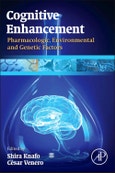Cognitive Enhancement: Pharmacologic, Environmental and Genetic Factors addresses the gap that exists in research on the topic, gathering multidisciplinary knowledge and tools that help the reader understand the basics of cognitive enhancement. It also provides assistance in designing procedures and pharmacological approaches to further the use of novel cognitive enhancers, a field that offers potential benefit to a variety of populations, including those with neurologic and psychiatric disorders, mild aging-related cognitive impairment, and those who want to improve intellectual performance.
The text builds on our knowledge of the molecular/cellular basis of cognitive function, offering the technological developments that may soon enhance cognition. Separate sections cover enhancement drugs, environmental conditions, and genetic factors in terms of both human and animal studies, including both healthy/young and aging/diseased individuals.
Please Note: This is an On Demand product, delivery may take up to 11 working days after payment has been received.
Table of Contents
1. What Is Cognitive Enhancement?
2. Signaling Pathways Involved in Cognitive Enhancement
3. Molecular Mechanisms of Drug-Induced Cognitive Enhancement
4. Role of Environment, Epigenetics and Synapses in Cognitive Enhancement
5. Transgenic Mice with Enhanced Cognition
6. The Use of Viral Vectors to Enhance Cognition
7. Advancing Fear Memory Research with Optogenetics
8. Can Stem Cells be used to Enhance Cognition?
9. Alzheimer's Disease and Mechanism-Based Attempts to Enhance Cognition
10. Pharmacological treatment of cognitive dysfunction in neuropsychiatric disorders
11. Cognitive Enhancement in Humans
12. The Use of Transcranial Direct Current Stimulation for Cognitive Enhancement
13. Cognitive Enhancement: Ethical Considerations and a Look into the Future








